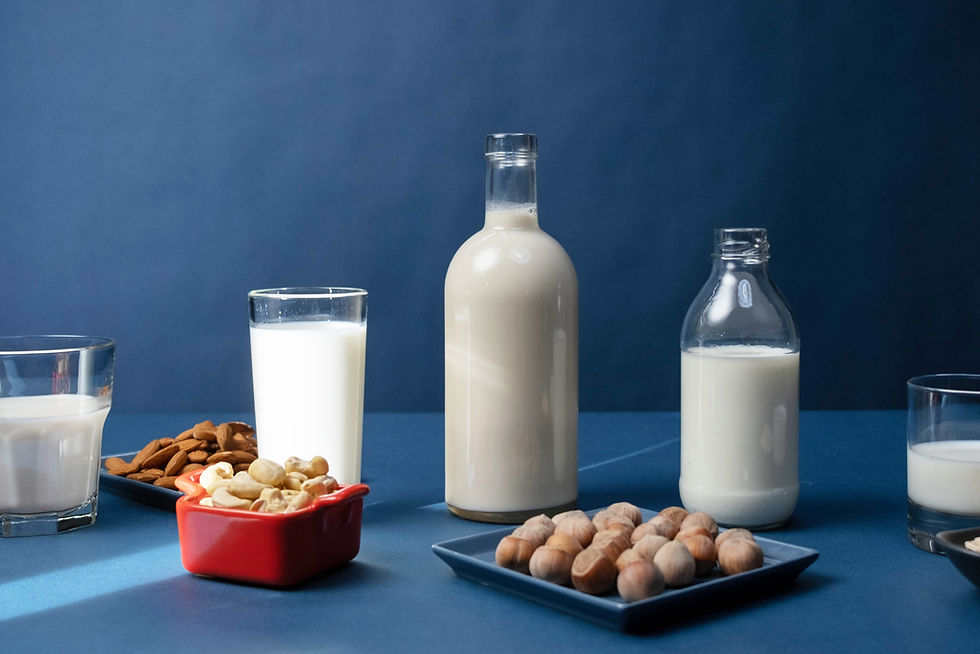Traditional Milk vs Alternative Milk: Health Pros and Cons for Seniors
- HC4S

- Jul 19, 2024
- 5 min read
Updated: Feb 12, 2025
As we age, our dietary needs evolve, and choosing the right type of milk can play a crucial role in maintaining overall health. Seniors often face decisions between traditional cow milk and various plant-based alternatives like almond, soy, cashew, or oat milk. Each type of milk has its own set of benefits and drawbacks. Here, we compare the health pros and cons of regular milk and alternative milk for seniors.

Regular Milk Health Benefits and Disadvantages
Regular Milk Pros:
Regular cow milk is a well-known source of essential nutrients, including calcium, vitamin D, potassium, B vitamins, and high-quality protein. These nutrients are vital for maintaining bone health, muscle function, and overall well-being, which are important for seniors at risk of osteoporosis and muscle loss.
The calcium in cow milk is highly bioavailable, meaning it is easily absorbed and utilized by the body. This is crucial for seniors to help prevent bone density loss, fractures, and osteoporosis in seniors.
Cow milk provides all nine essential amino acids, making it a complete protein source that supports muscle repair and maintenance. This is vital for seniors to help prevent sarcopenia (age-related muscle loss).
Many cow milk products are fortified with vitamin D, which is essential for calcium absorption and bone health. Vitamin D deficiency is common in seniors, and fortified milk can help address this issue.
Cow milk is roughly 87% water, contributing to daily fluid intake. Proper hydration is crucial for seniors to maintain bodily functions, prevent dehydration, and support overall health.
Regular Milk Cons:
Seniors may develop lactose intolerance, leading to digestive issues such as bloating, gas, and diarrhea after consuming regular milk. This can discourage adequate milk consumption and, consequently, reduce nutrient intake.
Whole milk contains higher levels of saturated fat, which can contribute to heart disease and other cardiovascular issues. Low-fat or skim milk options are available but may not be as appealing or satisfying to some seniors.
Some seniors may have a milk protein allergy or sensitivity to cow milk, which can cause severe allergic reactions or milder symptoms such as digestive discomfort and skin issues. These individuals should seek alternative sources of nutrients provided by cow milk. This is less common in seniors but is still a potential concern.
Some commercially produced cow milk may contain traces of hormones and antibiotics used in dairy farming. While regulations are in place to minimize these residues, some consumers prefer to avoid them due to potential health concerns.
Some studies suggest a potential link between high consumption of dairy products and an increased risk of prostate cancer. While the evidence is not conclusive, it is a consideration for seniors, especially men, when choosing their dietary options.
Alternative Milks
Almond Milk Pros
Almond milk is significantly lower in calories than regular milk, which can help seniors manage their weight.
As a plant-based milk, almond milk is naturally lactose-free, making it a good option for those with lactose intolerance.
Almond milk is a good source of vitamin E, an antioxidant that helps protect cells from damage and supports skin health.
Almond milk contains healthy fats that can help improve cholesterol levels and support heart health.
Its mild and slightly nutty flavor makes it a versatile addition to both sweet and savory dishes.
Almond Milk Cons
Almond milk contains less protein compared to cow milk, which may be insufficient for seniors who need higher protein intake to maintain muscle mass.
Many commercial almond milk products contain added sugars, which can be detrimental to health if consumed in excess. However, you can opt for unsweetened almond milk options.
Almond milk can cause allergic reactions in individuals with nut allergies.
Almond farming requires a significant amount of water, raising environmental sustainability concerns.
Unfortified almond milk lacks several essential nutrients present in cow milk, such as calcium and vitamin D.
Soy Milk Pros
Soy milk is one of the few plant-based milk that provides comparable protein levels to cow’s milk, making it a valuable option for maintaining muscle mass and repair.
Soy milk is often fortified with calcium, vitamin D, and vitamin B12, essential nutrients for seniors.
Soy contains isoflavones, which have been linked to reduced cholesterol levels and improved heart health.
Naturally free of lactose, soy milk is a suitable alternative for those with lactose intolerance.
Fortified soy milk provides calcium and vitamin D, supporting bone health and reducing the risk of osteoporosis.
Soy Milk Cons
Soy is a common allergen, and some individuals may experience allergic reactions.
Soy contains phytoestrogens, which can mimic estrogen in the body. While generally safe, they may not be suitable for individuals with specific hormonal concerns.
Some seniors may find the taste of soy milk less appealing compared to other milk alternatives.
Some seniors may experience digestive discomfort or bloating from soy products.
Much of the soy grown is genetically modified, raising concerns for those preferring non-GMO products.
Soy Milk Pros
Cashew milk is a good source of healthy fats, vitamins E and K, and magnesium. These nutrients support overall health, including heart health and bone strength.
Cashew milk has a naturally creamy and smooth texture, making it an excellent dairy substitute for coffee, smoothies, and cooking, without the need for added thickeners,
As a plant-based milk, cashew milk is naturally free of lactose, making it suitable for those with lactose intolerance or dairy allergies.
Cashew milk is generally lower in calories compared to cow milk, helping with weight management.
Contains healthy monounsaturated fats that support heart health by improving cholesterol levels.
Cashew Milk Cons
Cashew milk is relatively low in protein compared to cow’s milk and some other plant-based milk like soy milk. This might not meet the protein needs of seniors who require higher intake to maintain muscle mass.
Many commercial cashew milk products contain added sugars, preservatives, and other additives to enhance flavor and shelf life, which can diminish its health benefits.
Cashew milk may lack some of the essential nutrients found in regular milk, such as calcium and vitamin D unless fortified. Seniors relying solely on cashew milk might need to seek additional sources of these nutrients to meet their dietary requirements.
Cashew milk can trigger allergic reactions in individuals with nut allergies.
Commercial cashew milk products often contain added sugars, which can be unhealthy if consumed frequently.
Oat Milk Pros
Oat milk is higher in fiber compared to other milk alternatives, which can aid digestion and promote heart health.
It is naturally free of cholesterol and low in saturated fat, benefiting heart health.
Oat milk production is generally more environmentally friendly compared to dairy farming.
Oat milk has a thick, creamy texture that works well in coffee, tea, and cooking.
As a plant-based milk, oat milk is suitable for those with lactose intolerance or dairy allergies.
Oat Milk Cons
Oat milk contains more carbohydrates, which may be a concern for seniors managing blood sugar levels.
Similar to almond milk, oat milk is lower in protein compared to cow’s milk and soy milk, which may not meet seniors' protein needs.
Many commercial oat milk products contain added sugars to enhance flavor.
Although oats are naturally gluten-free, cross-contamination during processing can be an issue for those with gluten intolerance or celiac disease.
The nutrients in oat milk, such as calcium and vitamin D, may not be as bioavailable as those in cow milk, potentially affecting overall nutritional benefit.
Conclusion
By weighing these pros and cons, seniors can make informed decisions about including cow milk in their diet or opting for an alternative option. Choosing between regular milk and alternative milk options depends on individual health needs and preferences. For seniors, cow’s milk offers a nutrient-rich profile with readily available calcium and protein, but may not be suitable for those with lactose intolerance or milk allergies.
Alternative milk choices like almond, soy, cashew, and oat provide valuable options for those needing lactose-free or lower-calorie choices, though they often come with their own set of nutritional trade-offs.
Ultimately, seniors should consider their overall dietary needs, health conditions, and taste preferences when selecting the type of milk that best supports their well-being. Consulting with a healthcare provider or nutritionist can also help in making an informed decision tailored to individual health requirements.





Comments